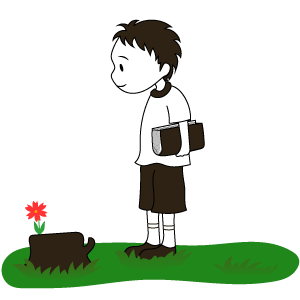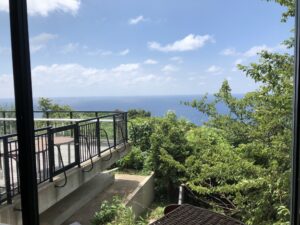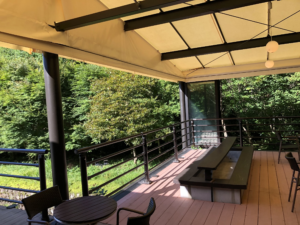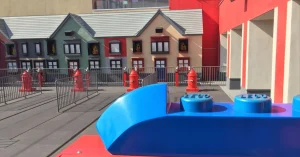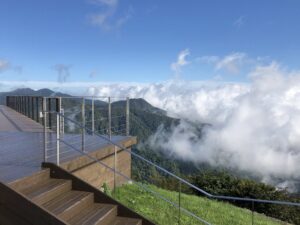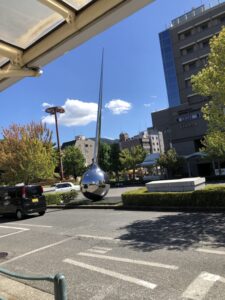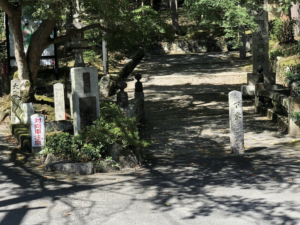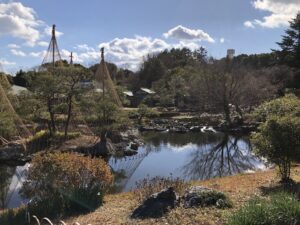After Obon, it feels like the season has suddenly changed.
The quality of the wind changes, or perhaps the entire air is replaced.
The smallest of details can suddenly change the season.
I went on a trip to Fukui a little while ago in the midst of a humid cicada rain.
Fukui was a place near and far for me, and I had only fond memories of eating crab at Tojinbo and Echizen Beach on a family vacation long ago.
Naturally, I also visited Eiheiji Temple on that trip, but even among my faded memories, Eiheiji had a strong impact on me.
When we often think of temple tours, we tend to visit a series of temples here and there, and after a few years, the memories of all the temples tend to merge into a combined image of the temples, with Kiyomizu-dera Temple at the center.
However, the Eiheiji temple that this 13-year-old boy saw was a little different.
Even as a child, he thought, “This temple is a little different from other temples.
Even though I have almost no spiritual sense, I have encountered strange phenomena several times before. This experience (which I will write about later) was one of them.
It happened as soon as I stood in front of that famous gate of Eiheiji Temple,
As soon as I stood in front of the famous gate of Eiheiji, I was struck by a strong feeling of déjà vu: “I was once in this temple.
I saw myself diligently dusting the corridor with a rag. I also recalled the coldness of the rag in my hands in a very real way.
These memories came to mind as a series of clear images.
It may be true to say that these were just memories of a scene from a news program or a picture in a school textbook, but there was a certainty about what I saw at that time that set it apart from such memories brought from outside.
It was also the height of summer, and there were all kinds of cicadas singing, including abura-zemi and kuma-zemi, but I did not hear any such cicadas at that time. However, I was walking aimlessly along the gravel road, completely entranced by such déjà vu.
Then, my mother, who was walking next to me, suddenly said something like this: “Don’t you miss it?
Don’t you miss it? How would you like to become a monk after junior high school? I was surprised at her words.
I was surprised by her words. It was the first time I had ever been to Eiheiji, and I had never mentioned that I liked the temple or that I wanted to become a monk in the future.
My mother at that time was what is called an “educated mother,” who thought nothing of her child’s future except to make sure he got good grades, so there was no way she would have said anything about his future as a Buddhist monk.
I heard about this much later, but the mother did not remember any of the conversation we had at that time.
In fact, when I persistently asked her about it, she became angry, saying, “I would never say such a thing.
She was absolutely mortified, but her mother’s words certainly shook him to his core.
I even thought to myself, “This may be my destiny.
If I had not firmly decided at that time that I would become a novelist in the future, I might have said “yes” without thinking.
If I had done so, I might still be writing novels while working as a monk, regardless of what would have happened to me by now. Or maybe I wouldn’t have written it in the first place.
After a while, the mother said coolly to her son, who remained silent for a long time, “Well, yes,” she said,
Anyway, it’s hot, and I’d like something cold to eat,” she said, and began fanning herself with a fan she had bought at a souvenir shop in front of the gate.
I can still recall in detail the sequence of events, including the design of the fan my mother was fanning me with at the time.
The cicada rain, Eiheiji Temple, the gate, the dazzling summer light.
Decades later, I revisited Eiheiji again.
Before visiting Eiheiji this time, I had faint hopes that perhaps the déjà vu would come back again, but unfortunately nothing happened when I came face to face with the Eiheiji temple gate.
I just remembered this mysterious experience of the past itself.
Now I am not a monk, a priest, or a trainee monk. I am just a writer of three sentences who writes novels every day.
The dreams that I had as a young boy were too strong, but they did not always lead me to success, like Shohei Otani’s dreams.
It reduces the options in life that might have been more apt, that might actually have made him happier there. To say that fate is happy is an argument only a handful of successful people have.
I think about this every time I recall the memory of this Eiheiji déjà vu.
Do the dreams we had in our childhood enhance our lives or destroy them?
I still don’t know. I am sure I will not know even after my death.
However, the fact that I still read Dogen’s Shobogenzo and do zazen every morning may be proof that I may have really been at Eiheiji once.
“Autumn is in the air, and summer’s journey is far away.”
